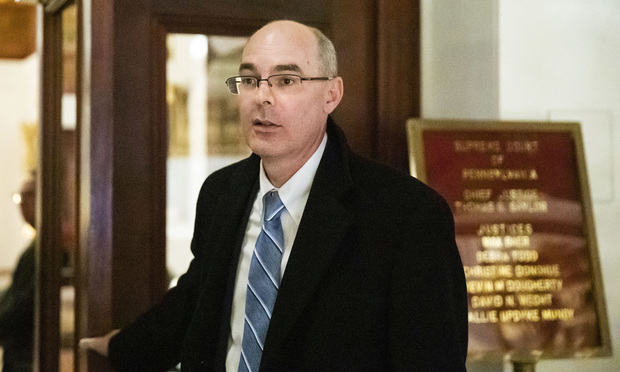Hearing Over Frank Fina Suspension Recommendation Shows Fault Lines Among Pa. Justices
The Office of Disciplinary Counsel has contended that Fina's promises not to question Baldwin about issues that could implicate Penn State Athletic Department officials misled grand jury supervising Judge Barry Feudale into believing there was no need to have that hearing.
November 20, 2019 at 05:40 PM
5 minute read
 Former state prosecutor Frank Fina departs after oral argument before the Pennsylvania Supreme Court at the Pennsylvania Capitol in Harrisburg on Nov. 20, 2019. (AP Photo/Matt Rourke)
Former state prosecutor Frank Fina departs after oral argument before the Pennsylvania Supreme Court at the Pennsylvania Capitol in Harrisburg on Nov. 20, 2019. (AP Photo/Matt Rourke)
Oral arguments about whether former Deputy Attorney General Frank Fina should face discipline over his handling of the Jerry Sandusky case appeared to open divisions on the Pennsylvania Supreme Court during a lengthy argument session Wednesday in Harrisburg.
Chief Justice Thomas Saylor recused himself from the matter.
The Disciplinary Board has recommended that Fina should be suspended for one year plus one day for his role in investigating three former Penn State administrators over their handling of the Sandusky child sexual abuse scandal. Specifically, the Office of Disciplinary Counsel is arguing that Fina broke a disciplinary rule prohibiting attorneys from subpoenaing other lawyers to testify about their clients without prior judicial approval.
Fina's counsel, Dennis McAndrews of McAndrews Law Firm, said Fina's name didn't appear on the subpoena at issue, and that it had instead been issued by former acting Attorney General Bruce Beemer.
But Justice Max Baer was quick to disagree with that argument, saying line prosecutors are rarely the ones issuing subpoenas, and if the rule were enforced as strictly as McAndrews recommended it would be easy for prosecutors to get around it.
"This rule would no longer exist," Baer said. "I hope you have better arguments than that."
ODC attorney Amelia C. Kittredge faced similar scrutiny from Justices Kevin Dougherty and Sallie Updyke Mundy.
Quickly after Kittredge began presenting her case, Dougherty questioned how Fina could face discipline if Beemer signed the subpoena.
"Let's start from base one. Why are we here?" Dougherty said. He later asked, "Any time a subpoena is issued, the prosecuting attorney could be disciplined? Does that not [cause] a chilling effect?"
The conduct giving rise to the disciplinary issues now before the Supreme Court happened at an October 2012 hearing into whether state prosecutors could call Penn State's former general counsel Cynthia Baldwin to testify before an investigating grand jury. The ODC contended that, before that hearing occurred, another hearing should have taken place to specifically address whether Baldwin could testify before the grand jury, since, at the time, she was acting in a position seemingly representing both Penn State and former university officials Tim Curley and Gary Schultz. Since Curley and Schultz were already facing child endangerment charges, Baldwin's legal position in the case was characterized by several justices as "murky."
The ODC has contended that Fina's promises not to question Baldwin about issues that could implicate Curley and Schultz misled grand jury supervising Judge Barry Feudale into believing there was no need to have that hearing.
McAndrews, however, told the justices that the charges against his client were "extraordinary," and that, except for the Disciplinary Board, everyone who had heard the evidence in the case—including two Common Pleas Court judges and a three-member Disciplinary Board hearing panel—found Fina's conduct to be within the bounds of proper conduct.
"Every single one of them said there was no violation," McAndrews said.
According to McAndrews, the rule needs to be interpreted strictly, and so the fact that Fina's signature was not on the subpoena and that Feudale considered the issue meant there could be no violation. McAndrews also noted that part of the reason Feudale didn't think a hearing was necessary was because defense counsel had stipulated to waive attorney-client privilege on the issue.
However, Justice Christine Donohue said that argument was putting "the bunny in the hat," because the issue of whether Curley and Schultz actually had competent counsel who could have waived the privilege was a central question that needed to be resolved.
"That was the issue that had to be determined," Donohue said regarding the privilege waiver.
Adding to Donohue's comment, Justice David Wecht said the argument appeared to put multiple "bunnies in the hat."
"Wasn't it incumbent on your client to get a judicial ruling … on who held the privilege?" Wecht asked.
McAndrews maintained that the issue didn't lie solely at Fina's feet.
"Judge Feudale is the gatekeeper. We can try to move all the fault on Frank Fina and I don't think that's fair," McAndrews said, noting that, along with Feudale, Baldwin and another attorney for Penn State were present during the hearing.
Dougherty questioned Kittredge along those lines later on in the argument session, saying, "Why is it we appear to be blaming Mr. Fina … for the determination of Judge Feudale not to hold the hearing?"
Kittredge faced tough questioning from Dougherty and Mundy, with Mundy questioning about the role of Penn State's counsel.
Kittredge, however, maintained that, in conducting the grand jury hearing, it was Fina's job to make sure the privilege was protected.
"He was a public official and he breached the public trust," she said.
This content has been archived. It is available through our partners, LexisNexis® and Bloomberg Law.
To view this content, please continue to their sites.
Not a Lexis Subscriber?
Subscribe Now
Not a Bloomberg Law Subscriber?
Subscribe Now
NOT FOR REPRINT
© 2025 ALM Global, LLC, All Rights Reserved. Request academic re-use from www.copyright.com. All other uses, submit a request to [email protected]. For more information visit Asset & Logo Licensing.
You Might Like
View All
LSAT Administrator Sues to Block AI Tutor From Using ‘Famous, Distinctive’ Test Prep Materials
3 minute read
Disjunctive 'Severe or Pervasive' Standard Applies to Discrimination Claims Against University, Judge Rules
5 minute read
From 'Confusing Labyrinth' to Speeding 'Roller Coaster': Uncertainty Reigns in Title IX as Litigators Await Second Trump Admin
6 minute readTrending Stories
Who Got The Work
J. Brugh Lower of Gibbons has entered an appearance for industrial equipment supplier Devco Corporation in a pending trademark infringement lawsuit. The suit, accusing the defendant of selling knock-off Graco products, was filed Dec. 18 in New Jersey District Court by Rivkin Radler on behalf of Graco Inc. and Graco Minnesota. The case, assigned to U.S. District Judge Zahid N. Quraishi, is 3:24-cv-11294, Graco Inc. et al v. Devco Corporation.
Who Got The Work
Rebecca Maller-Stein and Kent A. Yalowitz of Arnold & Porter Kaye Scholer have entered their appearances for Hanaco Venture Capital and its executives, Lior Prosor and David Frankel, in a pending securities lawsuit. The action, filed on Dec. 24 in New York Southern District Court by Zell, Aron & Co. on behalf of Goldeneye Advisors, accuses the defendants of negligently and fraudulently managing the plaintiff's $1 million investment. The case, assigned to U.S. District Judge Vernon S. Broderick, is 1:24-cv-09918, Goldeneye Advisors, LLC v. Hanaco Venture Capital, Ltd. et al.
Who Got The Work
Attorneys from A&O Shearman has stepped in as defense counsel for Toronto-Dominion Bank and other defendants in a pending securities class action. The suit, filed Dec. 11 in New York Southern District Court by Bleichmar Fonti & Auld, accuses the defendants of concealing the bank's 'pervasive' deficiencies in regards to its compliance with the Bank Secrecy Act and the quality of its anti-money laundering controls. The case, assigned to U.S. District Judge Arun Subramanian, is 1:24-cv-09445, Gonzalez v. The Toronto-Dominion Bank et al.
Who Got The Work
Crown Castle International, a Pennsylvania company providing shared communications infrastructure, has turned to Luke D. Wolf of Gordon Rees Scully Mansukhani to fend off a pending breach-of-contract lawsuit. The court action, filed Nov. 25 in Michigan Eastern District Court by Hooper Hathaway PC on behalf of The Town Residences LLC, accuses Crown Castle of failing to transfer approximately $30,000 in utility payments from T-Mobile in breach of a roof-top lease and assignment agreement. The case, assigned to U.S. District Judge Susan K. Declercq, is 2:24-cv-13131, The Town Residences LLC v. T-Mobile US, Inc. et al.
Who Got The Work
Wilfred P. Coronato and Daniel M. Schwartz of McCarter & English have stepped in as defense counsel to Electrolux Home Products Inc. in a pending product liability lawsuit. The court action, filed Nov. 26 in New York Eastern District Court by Poulos Lopiccolo PC and Nagel Rice LLP on behalf of David Stern, alleges that the defendant's refrigerators’ drawers and shelving repeatedly break and fall apart within months after purchase. The case, assigned to U.S. District Judge Joan M. Azrack, is 2:24-cv-08204, Stern v. Electrolux Home Products, Inc.
Featured Firms
Law Offices of Gary Martin Hays & Associates, P.C.
(470) 294-1674
Law Offices of Mark E. Salomone
(857) 444-6468
Smith & Hassler
(713) 739-1250






